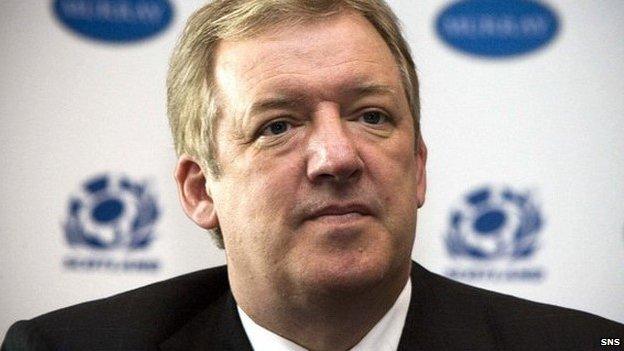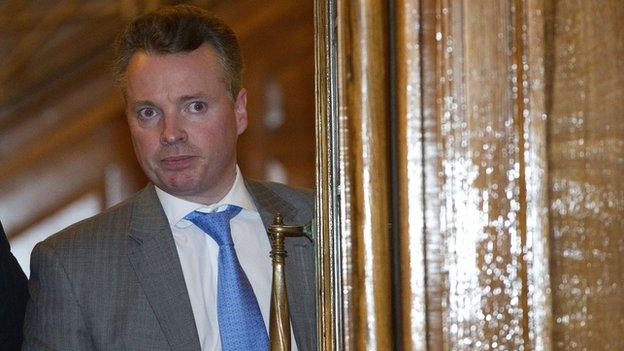Craig Whyte given maximum 15-year director ban
- Published

Craig Whyte's conduct in his dealings with Rangers was described as "reprehensible"
Former Rangers owner Craig Whyte has been banned from being a company director for 15 years.
The 43-year-old was handed the maximum ban possible after a judge heard his conduct in dealing with Rangers was "shocking and reprehensible".
Whyte was previously banned from being a director for seven years.
A second ban was sought by UK Business Secretary Vince Cable after Rangers' liquidation in 2012 and the subsequent liquidation of Whyte's firm, Tixway.
The petition raised on behalf of Mr Cable was heard at the Court of Session in Edinburgh.
Lengthy disqualification
Judge Lord Tyre said the case for imposing a period of disqualification on Whyte was "overwhelming".
"He deliberately placed his own interests before those of the company."
The judge said it was necessary and appropriate for him to impose as lengthy a period of disqualification as he was empowered to do.
David Thomson, counsel for Mr Cable, said: "He (Whyte) preferred his own interests to those of Rangers."

Whyte bought Rangers for £1 from former owner Sir David Murray
Mr Thomson told Lord Tyre: "It is my submission that this is a case falling within the top bracket of 10 years or more."
He maintained that Whyte's conduct as a director had made him unfit to be concerned in the management of a company.
Whyte, formerly of Castle Grant, Grantown on Spey, in Morayshire and Rue De Tenao, in Monaco, did not appear at court to defend the action.
Lawyers previously acting for him withdrew from the case.
Residence unknown
Mr Thomson was granted an amendment to the court document to state that his current place of residence was unknown.
Whyte bought Rangers for £1 from previous owner Sir David Murray on the understanding that he settled a club debt of £18m owed to Lloyds Banking Group.
The club was also involved in tax disputes with HM Revenue and Customs - known as the big and small tax cases.
During negotiations Whyte had a meeting with the independent board committee at Rangers where he was asked how he proposed to fund the purchase.
Mr Thomson said he was asked if the funding was coming from him as an individual and Whyte confirmed it was.
A subsequent email sent on his behalf indicated that the source of the money was funds generated by Liberty Capital, a British Virgin Islands company wholly owned by Whyte.
But it later emerged he had been negotiating with Ticketus for the provision of funding in exchange for money from the sale of season tickets over a three-year period.
Mr Thomson told the court: "His acquisition of Rangers was entirely predicated upon an untruth and the untruth was he would be funding the acquisition using his own personal wealth or that of his company."
The Secretary of State alleged in the action that Whyte failed to act in accordance with his duties as a director of Rangers, including in particular his duties to act in the best interests and promote the best interests of Rangers and to avoid conflicts of interest.
It was alleged that by causing Rangers to enter the Ticketus contract, and using the funds received to repay the debt due to Lloyds, he caused Rangers to give "financial assistance" in breach of Companies Act legislation.
It was said in the petition: "The effect of the Ticketus contract was that RFC effectively funded the purchase of its own shares.
"Quite apart from the unlawful nature of such a transaction the Ticketus contract was not on any view a transaction into which RFC should have entered."
'Failed to cooperate'
In the case of the other firm where he was a director, Tixway, it was ordered to be wound up in July 2012.
Mr Thomson said: "Over pounds two million of assets have either disappeared or, if they still exist, simply cannot be found by the liquidator."
It was alleged that Whyte failed to ensure that Tixway maintained adequate accounting records and failed to cooperate with the liquidator and Insolvency Service.
Whyte was previously banned for a period of seven years in a case concerning the misapplication of money and property to the detriment of creditors.
The Secretary of State was awarded the expenses of the proceedings.
- Published9 April 2014

- Published10 April 2013

- Published10 February 2012

- Published30 November 2011

- Attribution
- Published30 September 2014
